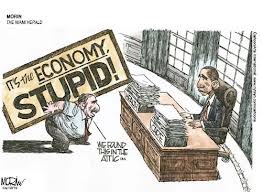“The end of the Cold War is our common victory”.
Gorbachev, January 1992
The Cold War came to an end because it was impossible for two powers to divide and rule the world, it led to renewed questioning of the US global role and in particular its involvement in peacekeeping and humanitarian interventions (Somalia, Rwanda, Kosovo) and in nation building. However, there was little real national debate on foreign policy interests and priorities. President Bush’s optimism about a ‘‘new world order’’ was short-lived as the US struggled to deal with conflicts in the Balkans and elsewhere. President Clinton’s priorities were expanding democracy, free markets, and preparing the US for the challenges of globalization. His emphasis on multilateral institutions should not hide the fact that his administration was also prepared to go it alone on many issues. Republican control of Congress from 1995 onwards made life difficult for Clinton. George W. Bush appointed an experienced team to run foreign policy. He began by rejecting many of Clinton’s policies and adopted mainly a unilateralist approach during his first term in office. Several international treaties were rejected and ‘‘new realism’’ was proclaimed as the guiding principle. The September 2001 terrorist attacks led to a major change in US foreign policy. The overwhelming priority was now ‘‘the war on terrorism’’ and other issues were downgraded. The invasion of Iraq, supposed to herald a new era of democracy in the wider Middle East, was hugely controversial. Bush’s foreign and security policy was a central issue of the 2004 presidential election. (Cameron, 2002)
This vision of a ‘‘new world order’’ had echoes of Wilsonian idealism but Bush did not maintain his grandiose rhetoric for long. His administration was faced with numerous pressing problems, including the break-up of the Soviet Union, the unification of Germany (a task it managed with considerable skill), a humanitarian catastrophe in Somalia, and the tragedy of Yugoslavia. (Cameron, 2002).
George H. Bush was an expert in foreign affairs, however he focuses too much in that and didn’t bring prosperity to the country, it was an Economic Depression in the U.S, then Clinton gave domestic issues as a priority and concentrate more in five key points. a) to restore the American economy to good health, ‘‘an essential prerequisite for foreign policy, b) to increase the importance attached to trade and open markets for American business, c) to demonstrate US leadership in the global economy, d) to help the developing countries grow faster and e) to promote democracy in Russia and elsewhere.
The post-Cold War presidents found it difficult to articulate a new strategy for the US. All were ready to intervene overseas to protect American interests. George H. W. Bush ensured public support for the Gulf War by linking it to American oil interests. Clinton was also ready to use military force, albeit reluctantly, for a mixture of motives, including humanitarian purposes. Clinton and George W. Bush differed in their approach toward multilateral institutions but the differences narrowed somewhat in the wake of the terrorist attacks and the need to secure international support to combat the terrorist threat. George W. Bush, however, accepted the neocon thesis that American military power could resolve most foreign policy problems. The Iraq war was to demonstrate both the potency and the impotency of US military power. (Cameron, 2002)
In my opinion it is clearly that at the end of the Cold War the United States wanted to demonstrate once again its supremacy and capacities and that they could maintain that. In this context it is possible to identify the different interventions that they did and try to show not only their own interests but also protecting other ones, that’s why its involvement in peacekeeping and humanitarian interventions. However was a challenge for the Americans to avoid a multipolarity world order just because they wanted to have under control different geopolitical scenarios especially in Latin America and Africa. Moreover it is important to mention that The United States knew perfectly how to take an advantage the “boom” of globalization that allowed to expand more effectively their principles and values.
References
Cameron, Fraser. (2002) US Foreign Policy after the Cold War. Global hegemon or reluctant sheriff?. Volume two: since 2002. Taylor & Francis Ed. Pp. 13-33.
John Gerard Ruggie (1997). “The Past as Prologue? Interests, Identity, and American Foreign Policy”, International Security, Vol. 21, No. 4, p. 89-125.

Deja un comentario